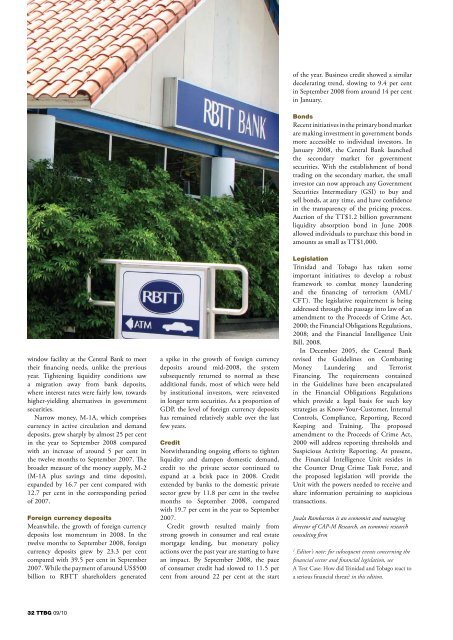The Trinidad & Tobago Business Guide (TTBG, 2009-10)
- No tags were found...
Create successful ePaper yourself
Turn your PDF publications into a flip-book with our unique Google optimized e-Paper software.
of the year. <strong>Business</strong> credit showed a similar<br />
decelerating trend, slowing to 9.4 per cent<br />
in September 2008 from around 14 per cent<br />
in January.<br />
Bonds<br />
Recent initiatives in the primary bond market<br />
are making investment in government bonds<br />
more accessible to individual investors. In<br />
January 2008, the Central Bank launched<br />
the secondary market for government<br />
securities. With the establishment of bond<br />
trading on the secondary market, the small<br />
investor can now approach any Government<br />
Securities Intermediary (GSI) to buy and<br />
sell bonds, at any time, and have confidence<br />
in the transparency of the pricing process.<br />
Auction of the TT$1.2 billion government<br />
liquidity absorption bond in June 2008<br />
allowed individuals to purchase this bond in<br />
amounts as small as TT$1,000.<br />
window facility at the Central Bank to meet<br />
their financing needs, unlike the previous<br />
year. Tightening liquidity conditions saw<br />
a migration away from bank deposits,<br />
where interest rates were fairly low, towards<br />
higher-yielding alternatives in government<br />
securities.<br />
Narrow money, M-1A, which comprises<br />
currency in active circulation and demand<br />
deposits, grew sharply by almost 25 per cent<br />
in the year to September 2008 compared<br />
with an increase of around 5 per cent in<br />
the twelve months to September 2007. <strong>The</strong><br />
broader measure of the money supply, M-2<br />
(M-1A plus savings and time deposits),<br />
expanded by 16.7 per cent compared with<br />
12.7 per cent in the corresponding period<br />
of 2007.<br />
Foreign currency deposits<br />
Meanwhile, the growth of foreign currency<br />
deposits lost momentum in 2008. In the<br />
twelve months to September 2008, foreign<br />
currency deposits grew by 23.3 per cent<br />
compared with 39.5 per cent in September<br />
2007. While the payment of around US$500<br />
billion to RBTT shareholders generated<br />
a spike in the growth of foreign currency<br />
deposits around mid-2008, the system<br />
subsequently returned to normal as these<br />
additional funds, most of which were held<br />
by institutional investors, were reinvested<br />
in longer term securities. As a proportion of<br />
GDP, the level of foreign currency deposits<br />
has remained relatively stable over the last<br />
few years.<br />
Credit<br />
Notwithstanding ongoing efforts to tighten<br />
liquidity and dampen domestic demand,<br />
credit to the private sector continued to<br />
expand at a brisk pace in 2008. Credit<br />
extended by banks to the domestic private<br />
sector grew by 11.8 per cent in the twelve<br />
months to September 2008, compared<br />
with 19.7 per cent in the year to September<br />
2007.<br />
Credit growth resulted mainly from<br />
strong growth in consumer and real estate<br />
mortgage lending, but monetary policy<br />
actions over the past year are starting to have<br />
an impact. By September 2008, the pace<br />
of consumer credit had slowed to 11.5 per<br />
cent from around 22 per cent at the start<br />
Legislation<br />
<strong>Trinidad</strong> and <strong>Tobago</strong> has taken some<br />
important initiatives to develop a robust<br />
framework to combat money laundering<br />
and the financing of terrorism (AML/<br />
CFT). <strong>The</strong> legislative requirement is being<br />
addressed through the passage into law of an<br />
amendment to the Proceeds of Crime Act,<br />
2000; the Financial Obligations Regulations,<br />
2008; and the Financial Intelligence Unit<br />
Bill, 2008.<br />
In December 2005, the Central Bank<br />
revised the <strong>Guide</strong>lines on Combating<br />
Money Laundering and Terrorist<br />
Financing. <strong>The</strong> requirements contained<br />
in the <strong>Guide</strong>lines have been encapsulated<br />
in the Financial Obligations Regulations<br />
which provide a legal basis for such key<br />
strategies as Know-Your-Customer, Internal<br />
Controls, Compliance, Reporting, Record<br />
Keeping and Training. <strong>The</strong> proposed<br />
amendment to the Proceeds of Crime Act,<br />
2000 will address reporting thresholds and<br />
Suspicious Activity Reporting. At present,<br />
the Financial Intelligence Unit resides in<br />
the Counter Drug Crime Task Force, and<br />
the proposed legislation will provide the<br />
Unit with the powers needed to receive and<br />
share information pertaining to suspicious<br />
transactions.<br />
Jwala Rambarran is an economist and managing<br />
director of CAP-M Research, an economic research<br />
consulting firm<br />
1<br />
Editor’s note: for subsequent events concerning the<br />
financial sector and financial legislation, see<br />
A Test Case: How did <strong>Trinidad</strong> and <strong>Tobago</strong> react to<br />
a serious financial threat? in this edition.<br />
32 <strong>TTBG</strong> 09/<strong>10</strong>


















